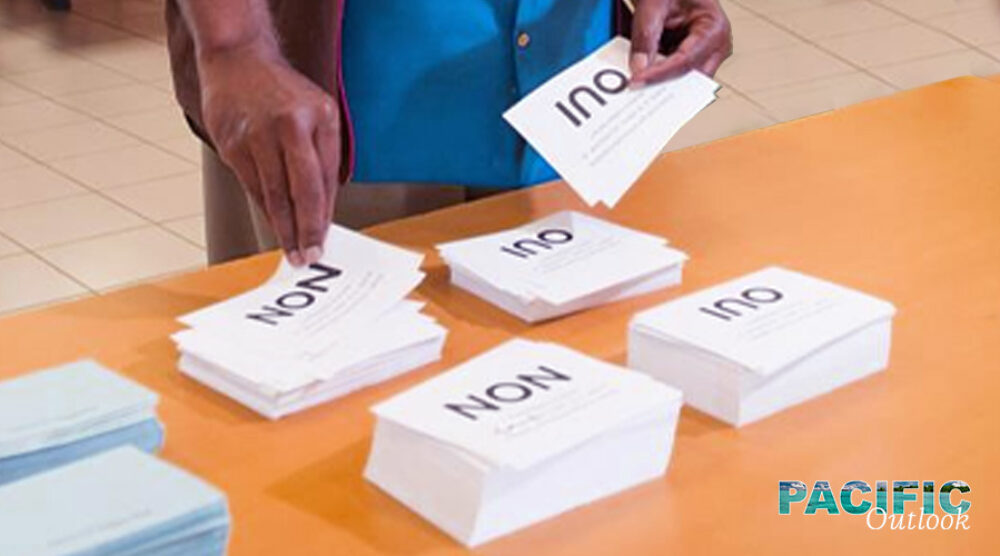On 4 October, New Caledonians will vote in a referendum on self-determination, to determine the islands’ future political status.
The French Pacific dependency is one of Australia’s closest neighbours, just 1,500 kilometres off the coast of Queensland. But New Caledonia rarely features in the Australian media and occasional newspaper reports don’t reflect the diverse community views about the future of their nation.
The Griffith Asia Institute webinar “New Caledonia – towards a new Pacific nation?”, to be broadcast at noon (AEST) on Thursday 17 September, provides an opportunity to hear about current developments from leading political activists.
The referendum campaign has heightened debate between members of the indigenous Melanesian people, known as Kanak, and more recent migrants from France, other French Pacific dependencies and parts of Asia. Despite overwhelming support for independence amongst the indigenous Kanak people – nearly 40 per cent of the population – most non-Kanak voters want to retain ties with France.
The issue of self-determination is also high on the regional agenda. The people of Bougainville have just voted for a new government to negotiate with the PNG government, after a 2019 referendum saw 97% of Bougainvilleans vote for independence. In West Papua, a growing independence movement faces new deployments of Indonesian police and military forces, as Jakarta rejects the call for self-determination.
In this light, New Caledonia presents unique features. The referendum on 4 October is the culmination of a process that began many decades ago, following armed clashes in 1984-88, a troubled period known as les évènements.
The French state, the independence coalition Front de Liberation Nationale Kanak et Socialiste (FLNKS) and conservative anti-independence parties reached an agreement in May 1998 known as the Noumea Accord. Entrenched in the French Constitution the following year, the Noumea Accord sets out a decolonisation process for New Caledonia, including measures of economic and social “rebalancing” and a twenty-year transition towards a new political status. After the transfer of legal and administrative powers to local institutions between 1998 and 2018, the colonised Kanak people and other long-term residents of New Caledonia would vote in a referendum on self-determination. Uniquely, the Noumea Accord allows for another two referendums, if a first vote for independence was unsuccessful.
In November 2018, the first referendum under the Accord posed the question: “Do you want New Caledonia to accede to full sovereignty and become independent?” In an unprecedented turnout, 56.7 per cent of voters decided to remain within the French Republic, while 43.3 per cent voted Yes to independence. These bald figures, with a clear majority opposing full sovereignty, suggest a setback for the FLNKS. In reality, the size of the Yes vote surprised most conservative politicians and pundits, who had predicted an overwhelming and strategic defeat for the independence movement.
This year’s follow-up referendum, however, comes in a different context. It’s a time of growing US-China tensions in the Pacific region, with a new strategic partnership between Australia and France. New Caledonians face significant adverse effects from the complex and interconnected crises facing all Pacific islands: a health crisis during the Covid-19 pandemic; an economic crisis affected by border closures and loss of trade and tourism revenues; and the ongoing climate emergency.
To discuss this context, the panellists for the 17 September webinar are a new generation of leaders. They completed university studies in Australia and Fiji rather than France, and are focused on how New Caledonia can be better integrated into its regional environment.
Former journalist Magalie Tingal is a leading campaigner for a Yes vote in the referendum, in the FLNKS independence movement. Jimmy Naouna has been active on the regional stage, previously working with the Melanesian Spearhead Group Secretariat in Vanuatu. Patricia Goa has led programs around culture, women’s rights and community development in New Caledonia’s northern province, serving today as a member of the national Congress.
Join us to hear these inspiring speakers. You can register for the webinar via Zoom or join the livestream via Facebook.
AUTHOR

Nic Maclellan is a correspondent for Islands Business magazine and other Pacific media. A regular visitor to New Caledonia, he reports regularly on France and the Pacific islands and is co-author of La France dans le Pacifique – de Bougainville à Moruroa (Editions La Découverte) and After Moruroa – France in the South Pacific (Ocean Press). He was recently awarded the 2020 Sean Dorney Grant for Pacific Journalism by the Walkley Foundation.
🌐The team at Griffith Asia Institute has gathered together some resources to get you up to speed on the story so far, what comes next, and what it means for #Australia and the #Pacific islands region. Access the Pacific Hub.








